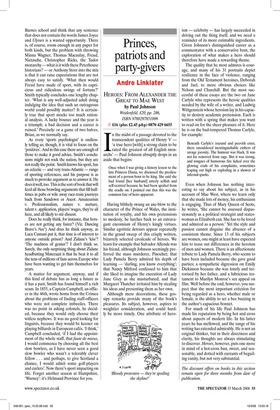Princes, patriots and party-givers
Andro Linklater
HEROES: FROM ALEXANDER THE GREAT TO MAE WEST by Paul Johnson Weidenfeld, £20, pp. 286, ISBN 9780297851899 ✆ £16 (plus £2.45 p&p) 0870 429 6655 In the midst of a passage devoted to the transcendent qualities of Henry V — ‘a true hero [with] a strong claim to be rated the greatest of all English monarchs’ — Paul Johnson abruptly drops in an aside that begins:
Once when I was giving a history lesson to the late Princess Diana, we discussed the predicament of a person born to be king. She said she had found [her husband] utterly selfish and self-centred because he had been spoiled from the cradle on. I pointed out that this was the common fate of heirs apparent.
Having blithely swung an axe-blow to the character of the Prince of Wales, the institution of royalty, and his own pretensions to modesty, he lurches back to an extravagant encomium of Henry’s kingly virtues. Similar egotistic detours appear repeatedly in the grand sweep of this crisply written, bizarrely selected cavalcade of heroes. We learn for example that Salvador Allende was his friend, although Johnson seemingly preferred the mass murderer, Pinochet; that Lady Pamela Berry admired his depth of learning — ‘darling, you know everything’; that Nancy Mitford confessed to him that she liked to imagine the execution of Lady Jane Grey as she masturbated; and that Margaret Thatcher irritated him by stealing his ideas and presenting them as her own.
Although mere decorations, these gossipy remarks provide many of the book’s pleasures. Its subject, however, aspires to weightier consideration, and could hardly be more timely. One attribute of hero ism — celebrity — has largely succeeded in driving out the thing itself, and we need a reminder of its more estimable ingredients. Given Johnson’s distinguished career as a commentator with a conservative bent, the exploration of what makes a hero should therefore have made a rewarding theme.
The quality that he most admires is courage, and many of his 31 portraits depict resilience in the face of violence, ranging from the Old Testament heroines, Deborah and Jael, to more obvious choices like Nelson and Churchill. But the most successful of these essays are the two on Jane Carlyle who represents the heroic qualities needed by the wife of a writer, and Ludwig Wittgenstein whose heroism lay in his capacity to destroy academic pretension. Each is written with a spring that makes you want to read on for the sheer pleasure of it. Here he is on the bad-tempered Thomas Carlyle, for example:
Beneath Carlyle’s iracund and peevish crust, there smouldered inextinguishable embers of savage jocosity. The humour was black. It was not far removed from rage. But it was strong, and tongues of humorous fire licked over the glowing coals of his complaints, sometimes leaping out high or exploding in a shower of infernal sparks.
Even when Johnson has nothing interesting to say about his subject, as in his account of Mae West, where we learn only that she made lots of money, his enthusiasm is engaging. Thus of Mary Queen of Scots, he writes, ‘She cannot be assessed dispassionately as a political strategist and stateswoman as Elizabeth can. She has to be loved and admired as a person.’ Yet the style and passion cannot disguise the absence of a consistent theme. Since 13 of his subjects are women, one might at least have expected him to tease out differences in the heroism of men and women. There is an affectionate tribute to Lady Pamela Berry, who seems to have been included because she gave good parties; a sympathetic digression on Emily Dickinson because she was lonely and terrorised by her father, and a lubricious testament to Marilyn Monroe’s sex appeal on film. Well before the end, however, you suspect that the most important criterion for being regarded as a hero, whether male or female, is the ability to set a bee buzzing in the author’s capacious bonnet.
For much of his life Paul Johnson has made his reputation by being hot and cross about aspects of modern life. In his latter years he has mellowed, and the range of his writing has extended admirably. He is not an original thinker, but in their directness and clarity, his thoughts are always stimulating to discover. Heroes, however, puts one more in mind of a hot-cross bun, sweet, and seasonable, and dotted with currants of beguiling vanity, but not very substantial.


























































































 Previous page
Previous page